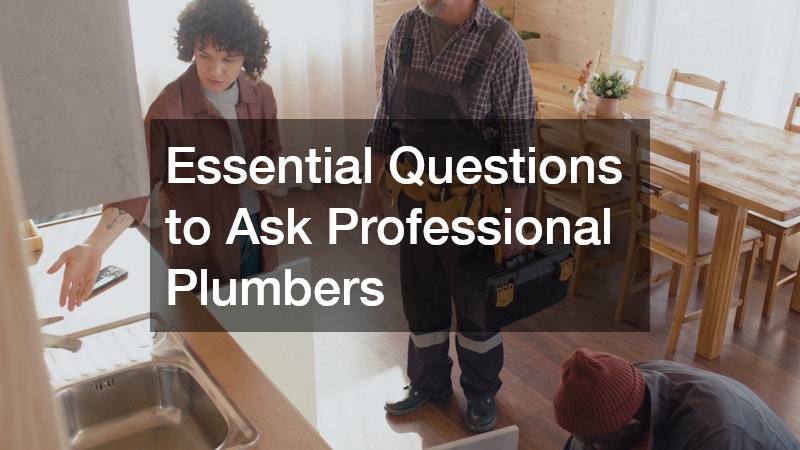When something goes wrong with your pipes or fixtures, you are trusting someone with both your home and your budget. Asking the right questions before you hire helps you avoid stressful surprises and make confident decisions. Instead of focusing only on who can show up fastest or who offers the lowest quote, take time to talk through expectations, qualifications, and communication. That conversation gives you a clearer picture of how different plumbers approach their work and whether they are a good fit for your project.
Are You Licensed, Insured, and Bonded?
Start by asking about licenses, insurance, and bonding. In many areas, plumbing work must be performed by state-licensed professionals, and reputable plumbers will be ready to share their license number and any certifications they hold.
Verifying this information helps you feel confident that they have met minimum training and competency standards. It also gives you a clear point of reference if anything goes wrong during or after the job.
Insurance and bonding protect both your property and the person doing the work. Ask whether the company carries general liability coverage and, if they have employees, workers’ compensation insurance. A properly insured plumber reduces the risk that you will be held responsible if an accident, injury, or mistake occurs on your property. Do not be shy about asking for proof; trustworthy pros expect this question and should be comfortable providing documentation.
What Experience Do You Have With My Type of Job?
Not every plumbing job is the same, and not every plumber focuses on the same kinds of projects. Ask how much experience they have with the specific issue you are facing, whether that is a persistent leak, water heater replacement, drain cleaning, or a full bathroom rough-in. A clear answer shows you whether they regularly handle similar work or if your project would be new territory for them. It is reasonable to prefer someone who has solved problems like yours many times before.
It can also be helpful to ask about the typical challenges they see with that type of job. An experienced professional can explain common complications, how they plan to handle them, and what signs they will watch for once the work begins. Their response gives you insight into their problem-solving style and whether they think ahead rather than simply reacting once something goes wrong. That level of experience often leads to smoother projects and fewer return visits.
How Do You Handle Pricing, Estimates, and Unexpected Issues?
Money questions can feel awkward, but clarity up front prevents frustration later. Ask whether they charge by the hour or by the job, and what is included in the estimate they provide. Some plumbers prefer flat-rate pricing that covers labor and basic materials, while others bill time and materials separately. Understanding their structure helps you compare bids and decide what feels most predictable for your budget.
You should also ask what happens if they discover additional problems once they start working. Do they stop and get your approval before proceeding, or do they have a threshold under which they will move forward without checking in? A clear policy keeps you from being surprised by a much higher bill at the end. Finally, ask about payment expectations, such as deposits, accepted payment methods, and when the final balance is due. Transparent answers are a strong sign of professionalism.
What Are Your Guarantees and Communication Practices?
A good plumber stands behind their work. Ask what kind of warranty they offer on labor and how manufacturer warranties on parts are handled. Some plumbers provide written guarantees for a specific period, while others handle follow-up on a case-by-case basis. Knowing what is covered, and for how long, can influence which bid you ultimately choose, especially for larger projects like repipes or water heater installation.
Communication matters just as much as technical skill. Ask how they handle scheduling, updates, and questions. Will you receive a call or text when the technician is on the way? Who should you contact if you have concerns after the job is complete? A professional who explains their communication process shows respect for your time and peace of mind. This is especially important if you are juggling work, family, and other responsibilities while the project is underway.
In the end, the questions you ask before hiring help you avoid rushed decisions and confusing expectations. By focusing on licensing, experience, pricing, warranties, and communication, you can choose a professional who treats your home with care and takes your concerns seriously. A little preparation now makes it much more likely that your next plumbing visit feels organized, predictable, and stress-free.




